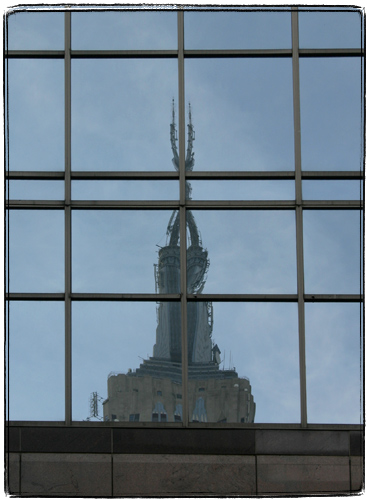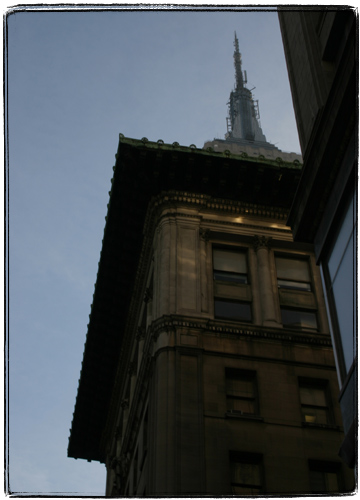“No news is good news” – that’s what one of the old Usenet newsreaders used to say when there weren’t any new articles to read in your subscriptions. Is that a coincidence that CNN, one of the two evil companies that employs Lord Vader himself as its mouthpiece, is so obsessed with violent, fiery death? Cartoonist Jeffery Rowland even felt that he needed a special new word coined for this phenomenon.
CNN.com is a news site that I frequently visit, mostly because the url is so much nicer than http://news.bbc.co.uk, which is superior in all regards to CNN. As far as news goes, I am mostly interested in what’s happening in five countries: the US, Russia, Ukraine, Turkmenistan, Israel and Japan. Why Turkmenistan? Because of the Great Serdar, of course. In any case, not many interesting things happen in Canada or the UK, and I could not care less for France, Germany and the rest of the Snootyland. Communist China and North Korea do not let out any interesting news and news from the entire African continent are usually too depressing.
Japan, on the other hand, is very close to my heart. Recently I found an outstanding English language Japanese news source, MSN Mainichi Daily News. There’s even an RSS feed for it.
What’s different in Japanese news? Well, first of all there’s a lot more sex-related news. American news are heavy on violence, but light on sex. MSN Mainichi Daily News are full of headlines very much in the spirit of one famous hacker’s “Dear Japanese People” posts.
Right now, the headlines are full of stories about a 57 year old fortune teller living with a “harem” of “about 10 women.” An older popular news story featured an embezzling accountant who spent stolen money on 17 mistresses.
Swimwear photo specials are frequent and highly detailed. Booth bunnies also get photo coverage. Sadly, Japan Swimsuit Association does not have its own website.
There’s some coverage about “maid cafes” for “otaku” in Akihabara (you can see Kitya’s post for photos.
Unhealthy Japanese obsession with schoolgirls is clearly present in the news: not a day goes by when there isn’t a schoolgirl sex-related article on Mainichi. Here’s a typical one:
It gets more complicated than that:
“The two 18-year-old, third-year high school girls, whose names are being withheld under the Juvenile Law, threatened on Dec. 29 to reveal that the 19-year-old private 1st class had sex with one of them unless he handed over 2 million yen, local police said.
They forced a 21-year-old lance corporal who was accompanying the private to withdraw 400,000 yen from an automatic teller machine at a convenience store in Sasebo and received the money from him.
The girls subsequently demanded 1.6 million yen from the GSDF soldiers. However, the soldiers consulted police, who arrested the two girls.
A fisherman and two other men were earlier arrested for giving the girls advice on how to extort money from the victim.”
US military men are frequently in the news for murder, rape, tresspassing, and robbery. This is not good, and mostly unreported here, in the US.
Japanese news agencies are no stranger to violence. A particularly unsettling trend that I noticed is an abundance of stories about family violence in Japan: “Man stabbed parents because they wouldn’t drink his miso soup“, “Man arrested for leaving bed-ridden, elderly mother to die“, “Woman nabbed for fatally kicking boyfriend“. It gets weirder, too: “Jobless man sets fire to futon in house after mom refuses to buy him dolls.” Overall, all these stories feature jobless people.
Violent (“Homeless man stabs abusive youth in stomach“) and non-violent homeless people (“Homeless man can officially register a public park where he lives as his residence, a court has said“) are often in the news.
We all think about how safe life in Japan is, but according to the news that I see, if the jobless, the homeless and the US servicemen won’t get you, train crashes, heavy snow, natural gas or sticky rice cakes will: “4 die after train blown off tracks in Yamagata“, “Elderly woman trapped in heavy snow freezes to death“, “Natural gas kills mother and children at hot spring“, “4 Kanto residents choke to death on sticky rice cakes“.
All those people got killed in heavy snow, yet mount Fuji was missing it’s snow cap last year. Strange.
The conflict of Japanese whalers and Greenpeace activists gets a lot of coverage: for some reason I’ve never seen this picture of a Greenpeace dude nearly harpooned to death anywhere else.
Two Japan-specific stories that don’t get much play in the US news is the Livedoor scandal and the badly constructed “twin” condo buildings. The Livedoor news get funny sometimes: “Convenience store chain am/pm Japan has decided to pull an energy drink developed by former Livedoor President Takafumi Horie off its shelves because it doesn’t want to sell items associated with scandal-tainted people, it has been learned“.
New Year’s cards (“nengajo“) are apparently a very serious business in Japan. From what I understand, they are supposed to be delivered exactly on January 1st. There was a flurry of news items like “Feces in 2 mailboxes stain 140 New Year cards“, “Post office to redeliver New Year’s postcards that arrived too early“, “Post office in Osaka to deliver 35 New Year’s cards a year late“. Big whoop. By the way, while we are on the subject, check out Japanese New Year’s prints by master woodblock printmaker David Bull.
There’s a section called “WaiWai“(with its own RSS feed). I am not sure what it means, as Wikipedia tells me that “Wai Wai” is a noodle snack.
The headline writers for Mainichi are prone to using puns and old-fashioned American slang, although not always very smoothly: they really overuse the words “nab”, “pinch”, “clink” (prison). Sometimes it feels like you are reading an old detective story.
This quote also is kind of unsettling:
Foreign sex workers get dirty digging for Japanese roots: “Gentlemen may well prefer blondes, but Japan’s not-so-gentle men seem to, as well, sparking a rapid increase in the number of South American sex workers with more yam than Yamato running through their veins to claim Japanese heritage, according to Spa!”
“More yam than Yamato”? What the hell?

